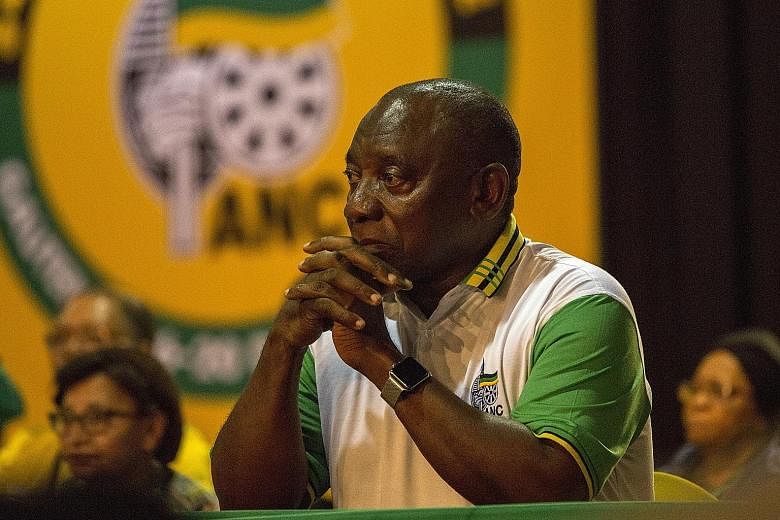CAPE TOWN • Mr Cyril Rama-phosa's long and eventful career has taken him from trade union activist to multimillionaire - and he is now set to become president of South Africa.
After South Africa dismantled apartheid, Mr Ramaphosa saw his hopes for the country's top job apparently dashed.
True to his pragmatic character, he opted instead for life in business - a move that brought him spectacular wealth.
But Wednesday's announcement by President Jacob Zuma that he was resigning immediately following a decision by the ruling African National Congress (ANC) to recall him cleared Mr Ramaphosa's way to the top job.
It was after Mr Ramaphosa failed to clinch the ANC nomination to succeed President Nelson Mandela in 1999 that he swopped politics for a foray into business that made him one of the wealthiest people in Africa.
The 65-year-old's impressive rise to eventually lead the ANC following its December conference would have come as no surprise to Mr Mandela. Mr Mandela once described Mr Ramaphosa as one of the most gifted leaders of the "new generation" - the young campaigners who rose in the 1970s, filling the void left by their jailed elders.
During his business career, Mr Ramaphosa held stakes in McDonald's and Coca-Cola's local ventures, and made millions in deals that required investors to partner with non-white shareholders.
He became one of the richest men on the continent, reaching No. 42 on the Forbes list of Africa's wealthiest people in 2015 with a net worth of US$450 million (S$593 million).
Out of politics for a decade, Mr Ramaphosa returned to the fray in 2012 when he was elected to the ANC's No. 2 post.
He became deputy president of the country in 2014, but was forced into a careful balancing act.
He both served Mr Zuma - tarred by accusations of corruption and incompetence - and also delivered occasional, cautious criticism of his former political master.
Born on Nov 17, 1952, in Soweto township, west of Johannesburg - a centre of the anti-apartheid struggle - Mr Ramaphosa became involved with student activism while studying law in the 1970s.
He was arrested in 1974 and spent 11 months in solitary confinement.
After studying, he turned to trade unionism - one of the few legal ways of protesting against the white-minority regime.
He founded the National Union of Mineworkers in 1982, which grew to have 300,000 members and led massive mine strikes in 1987 that shook the foundations of white rule.
When Mr Mandela was released in 1990 after 27 years in prison for opposing apartheid, Mr Ramaphosa was a key part of the task force that led the transition to democracy.
Mr Ramaphosa rose to global prominence as the ANC's lead negotiator, with his contribution seen as one factor in the success of the talks and the resulting peaceful democratic handover.
He then led the group that drew up the country's world-renowned new Constitution.
Mr Ramaphosa has four children with his second wife, Dr Tshepo Motsepe, a medical doctor.
AGENCE FRANCE-PRESSE

